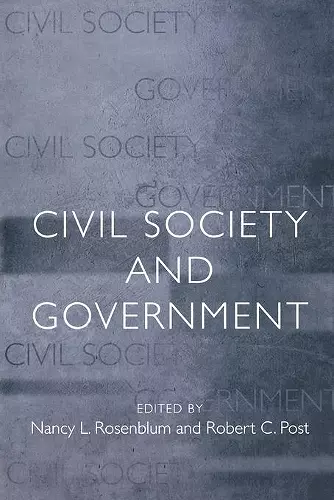Civil Society and Government
Robert C Post editor Nancy L Rosenblum editor
Format:Paperback
Publisher:Princeton University Press
Published:21st Jan '02
Currently unavailable, and unfortunately no date known when it will be back

Overall, there is nothing like this book that I know of. The contributors approach the question of the nature and place of civil society from within the most important contextual understandings of the major philosophical, ethical, and religious positions available in the world. This is a book that brings together material from an unusually wide range of perspectives on an important topic. The scholarship is first-rate--one profits from reading the footnotes as well as the text. -- Tracy Strong, University of California, San Diego The conversation about civil society is important and exciting, but remains marked by a high level of noise and a low level of coherence. This volume shows that the many disagreements over defining the concept of civil society are not simply explanatory--maybe not even mostly explanatory--but normative and ideological in nature. These essays begin to translate the terms of these perspectives into the language of civil society, a key preliminary to understanding the contours of the conversation. In so doing, the volume provides an important contribution to an increasingly rich conversation. -- Mark E. Warren, Georgetown University
Brings together an array of political, ethical, and religious perspectives to shed light on the complex relationship between civil society and the state. This book examines how civil society has been treated in classical liberalism, liberal egalitarianism, critical theory, feminism, natural law, Christianity, Judaism, Islam, and Confucianism.Civil Society and Government brings together an unprecedented array of political, ethical, and religious perspectives to shed light on the complex and much-debated relationship between civil society and the state. Some argue that civil society is a bulwark against government; others see it as an indispensable support for government. Civil society has been portrayed both as a independent of the state and as dependent upon it. This book reveals the extraordinary diversity of views on the subject by examining how civil society has been treated in classical liberalism, liberal egalitarianism, critical theory, feminism, natural law, Christianity, Judaism, Islam, and Confucianism. The volume draws on the work of eminent scholars to address six questions: In terms of function and consequences, does it matter where the line is drawn between civil society and the state? What is the relationship of civil society to the state? In what contexts and under what conditions should government interact with individuals directly or instead indirectly through communal associations? What are the prerogatives and duties of citizenship, and what is the role of civil society in forming good citizens? How should a society handle the conflicts that sometimes arise between the demands of citizenship and those of membership in the non-governmental associations of civil society? A theoretical introduction by the editors--political theorist Nancy Rosenblum and legal scholar Robert Post--and a conclusion by religious ethicist Richard Miller, tie the book together. In addition to Rosenblum, the contributors are Kenneth Baynes, David Biale, John Coleman, Farhad Kazemi, John Kelsay, William Galston, Will Kymlicka, Tom Palmer, Fred Miller, Susan Moller Okin, Peter Nosco, Henry Rosemont, Steven Scalet, David Schmidtz, William Sullivan, Max Stackhouse, Stephen White, and Noam Zohar.
"The writing is crisp, the research and argumentation uniformly good."--Choice
ISBN: 9780691088020
Dimensions: unknown
Weight: 595g
424 pages